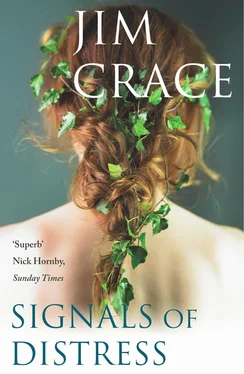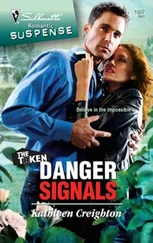Where was her daughter? How far out at sea? Aymer stared into the fire. Would she be happy in America? Too late to worry now. No need to worry now, in fact. Aymer could put right in his mind’s eye things that might go wrong in life. That was his major skill. He couldn’t quite remember Miggy’s face. No matter — he’d improve on her. He imagined her in Wilmington. She wasn’t gaping. She wasn’t fidgeting her feet. Nor wearing breeches. She was breathing through her nostrils, not her mouth. He gave her better skin and hair. He ribboned her. He put her in a simple cotton dress. He imagined her heavily pregnant, too. That, surely, was the spirit of the emigrant. And she was more lively in her speech, more generous, more womanly. America was suiting her.
He put her in a rocking chair, and spread one hem of her cotton dress across the arm. He served her a slice of honey cake, and a jug of some new drink. He couldn’t recognize its smell. He put her foot up on the balustrade of the veranda. Maize, tobacco, sweet potatoes, and snap beans were growing in the plot below. (Would there be snap beans in America? Aymer wasn’t sure.) There were chickens. There was sun. Whip was rolling in the grass.
Aymer shut his eyes and put himself into the scene. He was standing in the garden, looking up at Miggy. ‘In’t you too hot?’ she said. No, no, that wouldn’t do. She had to speak again, and this time with the slight brogue of the Carolinas. ‘Aren’t you too hot? Put on your sun hat, Mr Smith.’ Oh better, yes.
‘I can’t wear that foolish hat.’
‘Then you will bake.’
Aymer baking in America! Just the thought of it made him smile. Again he imagined himself in Wilmington with Miggy, Margaret ! This time he was sitting on a stool underneath a shag-bark tree. He put his back against the trunk and began a pencil sketch. The artist Aymer Smith! Another life, another dream. First he roughed in the framework of the rocking chair, and then he marked in Miggy’s black hair against the curving headrest. Then the outline of the jug. Then her ankles and her black boots, a happy balance with her hair. He left the paper blank for her white dress.
‘What will you do with it?’ she said.
‘The sketch?’ She nodded slightly, hardly moved her lips. She didn’t want to spoil the pose. ‘I’ll finish it and give it to Ralph. He can take it with him when he goes to sea. You’ll always be with him.’
‘What will you draw for Ralph and me, so that you’ll be remembered too, for your generosity?’ She forgot her pose, and waved her hands towards the house and garden. ‘Your sovereigns have paid the rent on this.’ Aymer shook his head, both in the parlour and in Wilmington. He didn’t want their gratitude. Why could no one understand that simple fact? ‘Perhaps you’ll do a portrait of yourself,’ she said.
Now Aymer almost had her face: undramatic, self-possessed, determined. She had one hand cupped underneath her belly, supporting her first child — two weeks from being born. Its head was tucked in above her bladder; its bottom pressed against her dress, and its heartbeat was racing on her fingertips. She stretched her legs. She was content — she’d heard that Ralph would be back in a day or two from his voyage on the Belle to Norfolk in Virginia. Her face was flushed and full. She wasn’t the ouncy girl she’d been at Dry Manston, dressed in breeches, thin-lipped and mistrustful. Nor was she the shoreline pessimist, expecting nothing from her life but the repetitions of the seasons and the sea. Here was a woman pioneer, roots up, and free. Aymer looked at her, imagined her, and he was proud. He had been right to let her go.
‘Shall I fetch the map?’ he’d say, if he could only walk in on her now. He’d take it from the table drawer and hold it for her in the sunlight. ‘Find Wilmington first.’ That was easy for her. She had found it many times. She only had to spot the W, and Ws were easy. ‘Now Norfolk, Margaret. Your finger must go north.’ And there was Norfolk, spread across the coast. The N was on the reaches of the estuary; the f was on the beach; the k was knee-deep in the sea. ‘Now read for me the places Ralph will pass before he comes back home.’ She’d read: Cape Hatteras. Raleigh Bay (pronounced uncertainly, but Aymer smiled and didn’t shake his head). Cape Lookout. Onslow Bay. Cape Fear. ‘You see, it isn’t difficult. You’re reading well. Read for Ralph when he comes home. Read something for your baby when it’s born. We can resume our lessons later on. I will teach you script.’
‘I’ll never learn. I in’t … I’m not that clever.’
‘You will. I’ll not leave here till you do. Just think what they’ll say in Wherrytown, Margaret, when you write home in your own hand.’
‘I’ll write down how it’s all thanks to you.’
‘You’ll tell them how you’re missing Wherrytown.’
‘I don’t miss anything.’
‘Nor anyone?’
‘Well, there’s my ma. I think of her. I do. But I’m to be a ma myself, so there’s the sense in it. I don’t expect my …’ (she’d drum her stomach with her fingers) ‘… to stick to me for ever more … I’ll love it though while it’s here. If it’s a girl we’ll give it mother’s name. That’s only right. We promised her. She’ll be American. Miss Rosie Parkiss.’
‘She’ll be the belle of Wilmington, Margaret. And what if you have a son? The beau of Wilmington, I suppose.’
‘We’ll name him after you, to mark your generosity to us. Master Aymer Parkiss. Don’t that sound high-falutin’? Oh, my! He’ll be the mayor!’
‘He’ll be the captain of a ship.’
AYMER wasn’t quite awake, nor quite asleep, when he invented Captain Aymer Parkiss. The parlour was too dark and quiet for sleep. And far too cold. The fire had not survived. He wrapped the blanket round his legs. He was
baby tempted to ring the parlour handbell for George or Mrs Yapp. Would either of them come? He’d like some fuel for the fire, another blanket and a warming drink. But it was far too late — or far too early — to summon them. He guessed the time was two or three o’clock. The window-panes were black. There would be at least three hours more of Solitary Pie before the glass thickened with any light. He’d have to ruminate the time away, grazing on the minutes of the night with only chimeras for company.
He’d had enough of Miggy Bowe and her offspring in Wilmington. He’d settled them. They didn’t trouble him. Now his thoughts had turned to Katie Norris and how, in this very parlour, he’d first set eyes on her. It wasn’t hard to recall her face. She’d worn a shoulder cape. She’d had black ribbons in her hair. The parlour grate had been cold and empty then as well: ‘We were hoping for a bit of fire,’ they’d said. A bit of fire in life , Aymer thought to himself. What fire could he kindle in his own, cool life, in those dark hours in the parlour? What else but some device to bring him back to Katie Norris? They’d have to meet again. In Canada, of course. That was possible. If Aymer was to keep his resolution to travel more in future, to see the greater works of man in Florence, Paris and Edinburgh, then why not travel to Canada as well to see dear friends?
He could imagine her in Canada, and ready for his visit. Their landscape was quite clear to him. He’d seen the prints of immigrants by Mr Gay in his Illustrations from the Colonies : ‘Glorious morning! What a fine country. Here at last is Canada!’ He was acquainted with the trees, their Latin names, the timber huts, the never-ending lakes, the distant prospect from the migrant ships of Cap Tourmente and the Laurentians. What would he do if he arrived in Montreal, Aymer wondered. Canada was big. How would he find the Norrises? He saw himself on unpaved streets, with wooden boards for pavements, and buildings in grey limestone and timber. All the men were tall and bearded. All the women wore thick boots. He’d look at every face he passed. He’d check the colour of the women’s hair. One day, surely, he’d meet Katie on the streets. ‘Why, Mrs Norris,’ he would say, ‘the world is smaller than we think …’ But, no, that wasn’t right. He knew he wouldn’t meet her on the streets, or in the market places, or coming out of church. She wouldn’t be in Montreal. The Norrises hadn’t gone to Canada for streets and marketplaces. Their dream had been a piece of land, a cabin in a clearing, privacy. They could be anywhere, from Sturgeon Falls to Lake St John, from mountaintop to shore.
Читать дальше












